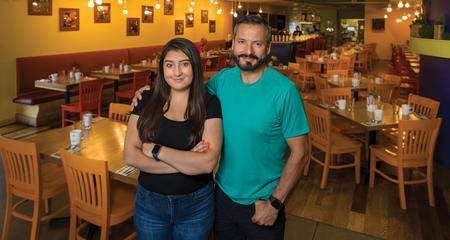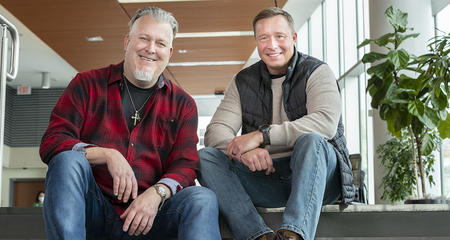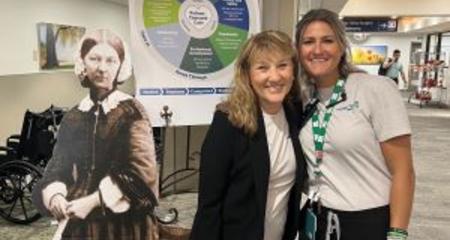My new patient was having trouble breathing and had lost his ability to swallow; despite this, he had been too proud to call either friends or family for help. He had lost thirty pounds and his clothes hung loosely. His belt was far too long. The day I met him, I thought, “This man could walk through a harp.”
People had tried. Over the previous months, his worried family members had made several attempts to see him, but he always pushed them away with excuses why they should not visit. One day over his protests, his daughter went to his house. "His voice sounded so different!" she said. When she pushed her way into the house, she had been alarmed at how he looked. She had taken him to the community hospital and, after a stop in the emergency room there, he was sent by ambulance to our medical center.
An examination and CT scan confirmed that he had a very large, inoperable throat cancer. Because he was in danger of completely obstructing his airway, we immediately took him to the operating room for a tracheotomy and a feeding tube. He spent the next few days getting accustomed to the new tubes. Now, he was getting close to heading back to his daughter’s house where he would stay while undergoing cancer treatment.
I stopped by his room and found him resting comfortably. As I entered, I greeted his daughter and two sons. The scene was all too familiar: a concerned but estranged family with a lot of history and a patient who had absolutely no interest in participating in his own care.
He coughed. They scowled. I looked for a way to make a connection.
I glanced at the bulletin board in his hospital room where the family had tacked up old photographs of the patient, his children, and his grandchildren. One photo in particular caught my eye. Five men stood in front of a bowling lane, hands on each other’s shoulders and beaming at the camera in their identical shirts. The hairstyles, heavy-rimmed eyeglasses, and faded colors of the image confirmed that the picture had been taken many years ago.
“What’s this?” I asked. “Tell me the story.”
“Oh. That’s from when Dad’s bowling team won the national championships in Las Vegas. He was one of their stars. If you ask him, he’ll tell you that being in that tournament was one of the proudest moments of his life.”
I studied the image and looked back-and-forth between the photograph and my patient. Sure enough, one of the smiling, healthy men had the same eyes as the man lying in the bed across the room. Otherwise, he was almost unrecognizable. The years and the cancer had changed him. The bowling star’s face was now gaunt, his biceps wasted, and the sleek black hair in the picture was now long, gray, and matted. His days of controlling the spin on a 16-pound ball were behind him.
I also noticed that three of the five men had packs of cigarettes in their shirt pockets. For me, the photo brought back memories of Saturday mornings spent at the bowling alley near where I grew up. I can still hear the bowling balls rolling down the lane, the concussion as they hit the pins, and the rumble as they returned. I can conjure the odors of lane oil, popcorn, and cigarette smoke that permeated the entire building. I remember watching stars Dick Weber and Don Carter on television.
“That’s amazing,” I said. “I loved watching bowling growing up. What an accomplishment!”
The patient beamed. When he tried to say something, he began coughing uncontrollably. When things subsided, he signaled for a pen.
He wrote on his pad of paper in big block letters then pointed at the photo and handed me the message. “WE WERE WINNERS.” He gave me a thumbs-up and closed his eyes again.
As I studied the notepad, his daughter peeked over my shoulder to see what he had written. “That was a long time ago, Dad.” She shook her head and pointed to photos of grandchildren and family gatherings. “He missed so much of this,” she said. “Bowling, drinking, and being with his buddies was his life back then. A lot of missed opportunities.”
He opened his eyes, looked at her, and shrugged. He pointed at the notepad and picked up his pen but, apparently thinking the better of it, set the pen back down and folded his hands. Soon, his eyes were closed once again.
___
An earlier version of this essay appeared in 2007. Thanks to my friends at Red Oak Writing.




Nicely done, Bruce. Very efficiently written, and great impact.
You seized the chance to make a connection with him, boosted his mood briefly---I would be curious about whether you thought he cooperated with your treatment better afterward--? The sadness of his not being able to bowl again may have been too overwhelming in this visit.